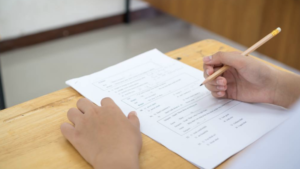Home » Commentary » Opinion » Wrestling the writing decline key to education improvement
· Canberra Times
 The dire state of Australian students’ writing is perhaps the worst-kept secret of our education system.
The dire state of Australian students’ writing is perhaps the worst-kept secret of our education system.
Two damning new reports – one on NAPLAN and one by the NSW Education Standards Authority – have exposed how the education system is failing Australian students when it comes to writing.
To be good writers, students should be taught how to express ideas effectively, structure coherent sentences, and apply correct spelling and grammar.
Too many students leave school without these basic capabilities, putting them at a long-term disadvantage in adulthood.
Even worse, Australian students are less literate than ever; despite policymakers committing record funding under the Gonski plan.
One in four boys in year 9 don’t meet the basic writing standards needed to be successful in work or further study.
Writing achievement hasn’t improved in NAPLAN since tests began.
Education unions like to claim this is a function of NAPLAN itself, however this is debunked by both recent reviews.
They find NAPLAN provides a good indicator of students’ writing ability – and it is poor.
The inconvenient truth is these findings should hardly come as a surprise to educators, employers or parents – who must be only too aware of the obviously substandard quality of writing.
Tragically, too many educators deny there is a problem at all – claiming that the way we communicate in modern life and work means students no longer need a mastery of language.
The ability to clearly express and communicate remains a critical skill, no matter what the medium is. These days, articulation and expression are actually in higher demand, not lower.
This is self-interested nonsense. The ability to clearly express and communicate remains a critical skill, no matter what the medium is.
These days, articulation and expression are actually in higher demand, not lower.
There are several things that can be done to solve the writing challenge.
First, policymakers must commit to maintaining and supporting quality writing assessment.
Without a good test, teachers can’t identify students who need extra help and how to target these efforts.
Tinkering with the test – such as a new proposal to assess students’ writing, spelling, and grammar all together in a single writing task – is likely to make things worse.
This would make the assessment more subjective and less accurate.
Instead, we must embrace an objective, evidence-based approach that re-emphasises the status and importance of competent writing.
One way to do this is to explicitly have teachers dedicated to developing students’ writing in high school – rather than responsibility being shared across subject area teachers.
It can no longer be assumed that just because students have gained basic skills during primary school, they will automatically become accomplished writers without properly nurturing and developing their abilities.
Of course, part of the problem is that too many teachers are not equipped to teach kids how to write properly.
The NSW Education Standards Authority review revealed that around half of NSW teachers aren’t trained to teach students how to write effectively and don’t dedicate enough time in class to it.
This is not surprising, as teacher’s education degrees have become littered with unnecessary and abstract theory, rather than equipping them with the skills they actually need.
Teaching writing properly is a technical and complex process; and given how fundamental a skill writing is, teacher training must focus on developing skills in how to teach writing.
This can’t be deferred until teachers are at the chalkface.
The scale of the writing malaise can no longer be ignored and is emerging as the key educational challenge facing our schools and teachers.
Progressive literacy fads have dominated school curricula in recent decades.
But while there’s been progress slaying fads in reading, this has distracted from the war effort against similar writing fads – particularly the “personal growth” method; which suggests teachers take a light touch approach, letting students express themselves without clear guidance.
Our students deserve an education that gives them every chance of success in their post-school life, work, and study.
The writing is on the wall should we fail to make the necessary commitment to reverse the writing wreckage.
Wrestling the writing decline key to education improvement